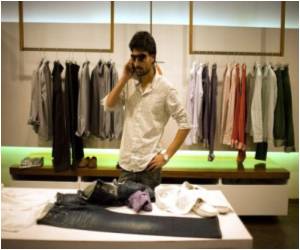Complete with two cars, foreign holidays, and a cook for their apartment, a family from Beijing seems to be a good example of China's rapid economic growth

Then, she cycled for hours from a shared dormitory to visit her husband's workplace. Now she commutes in a car made by an American firm and they holiday with their 11-year-old daughter in Japan, South Korea and the United States.
Tens of millions of others have made a similar transition. About 10 percent of China's 1.35 billion people now count as middle class, according to the Organisation for Economic Cooperation and Development, a figure set to rise to 40 percent by 2020.
But their concerns about air pollution, food safety and China's education system show the challenges facing the country's newly appointed leaders, who have promised a shift away from the model of growth at all costs.
Every year, Li and her husband set a goal to improve their lives. "We always have a plan," Li said. "For example, this year I might want a new camera, and my husband will help make that come true."
The family's four-bedroom apartment in a Beijing suburb was the most important purchase of their lives. "We struggled half our lives to buy it," Li said, over a breakfast of fried eggs and bacon.
Advertisement
Li says her top priority is Nancy's education. It is not a school day, but her iPhone alarm rings to signal that it is time for the girl's first lesson.
Advertisement
At weekends Nancy has sessions in traditional Chinese calligraphy, and a badminton class "with a private coach", Li said. In the past year, the young girl swapped learning the piano for a new instrument, the ocarina, a pocket-sized flute.
Nancy has only three or four hours of free time a day on weekends, Li said, as she seeks to hold her position in China's highly competitive education system.
A glut of graduates created by the expansion of China's university system means the graduate unemployment rate is higher than for the general population -- making winning a place at the very best colleges ever more crucial.
Getting into a top school is also not always about ability, Li said, with cash donations sometimes involved.
"Sometimes parents need to do extra work, give out red envelopes, and even then success can depend on your contacts," she said.
This year has bought some more worrying lessons. When thick smog blanketed northern China, sending pollution levels soaring in the capital, Nancy learned about PM 2.5, the name given to invisible pollutants which can damage children's lungs.
She reached into the pocket of her mother's car seat and pulled out a face mask. "My mum made me wear this every day in January and February because the PM 2.5 was very bad," she said.
At lunchtime, the family gathers in a chain restaurant over plates of braised pork, spicy tofu and buns filled with red-bean paste. But eating out is becoming a rarer treat.
Years of scandals involving poisoned food -- from tainted milk, to reprocessed "gutter oil", taken from drains and sold as new, to rat meat passed off as lamb -- make the family nervous about Beijing's restaurants.
"I try to make sure my daughter eats outside as little as possible," Li said.
At dinner time, Nancy runs to the door to greet her father, while a domestic helper cooks dozens of seafood-filled dumplings. Li Na pulls a bottle of imported Australian wine from a cabinet, before deciding on a New Zealand red.
Worries about safety mean they source their food carefully, ideally from farms near Li's home town, she said, adding: "There is corruption in the industry, which makes the problem worse."
The family have benefited hugely from decades of rapid economic growth, but Li hopes for more from China's new leadership, formally installed in March.
"Ordinary people are losing faith in the government, because of problems accumulating over a long period," she said.
"I don't think their main duty is to improve the economy... it's to improve the quality of life, so that we don't have to eat oil from the gutter, or worry about milk."
Source-AFP








